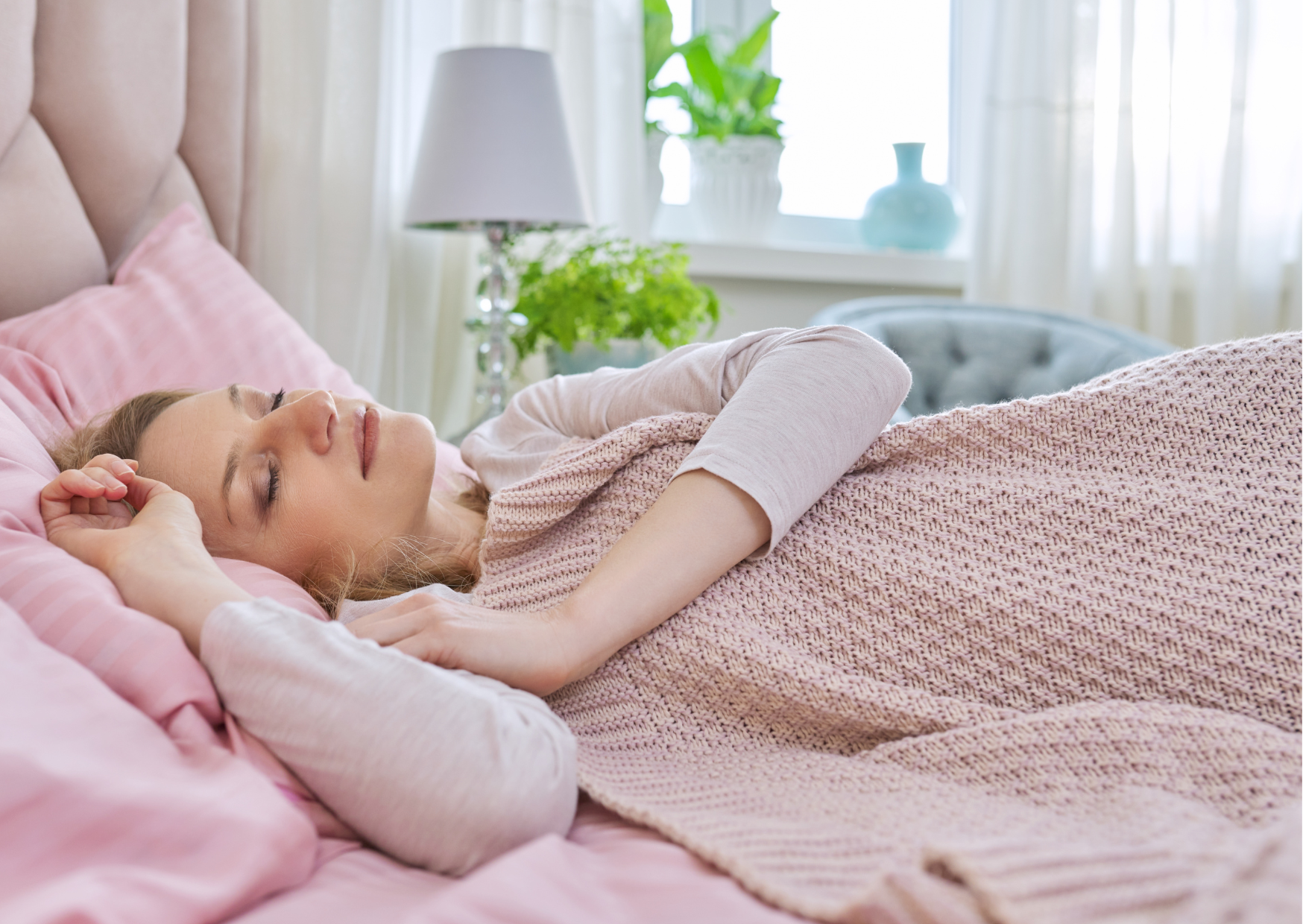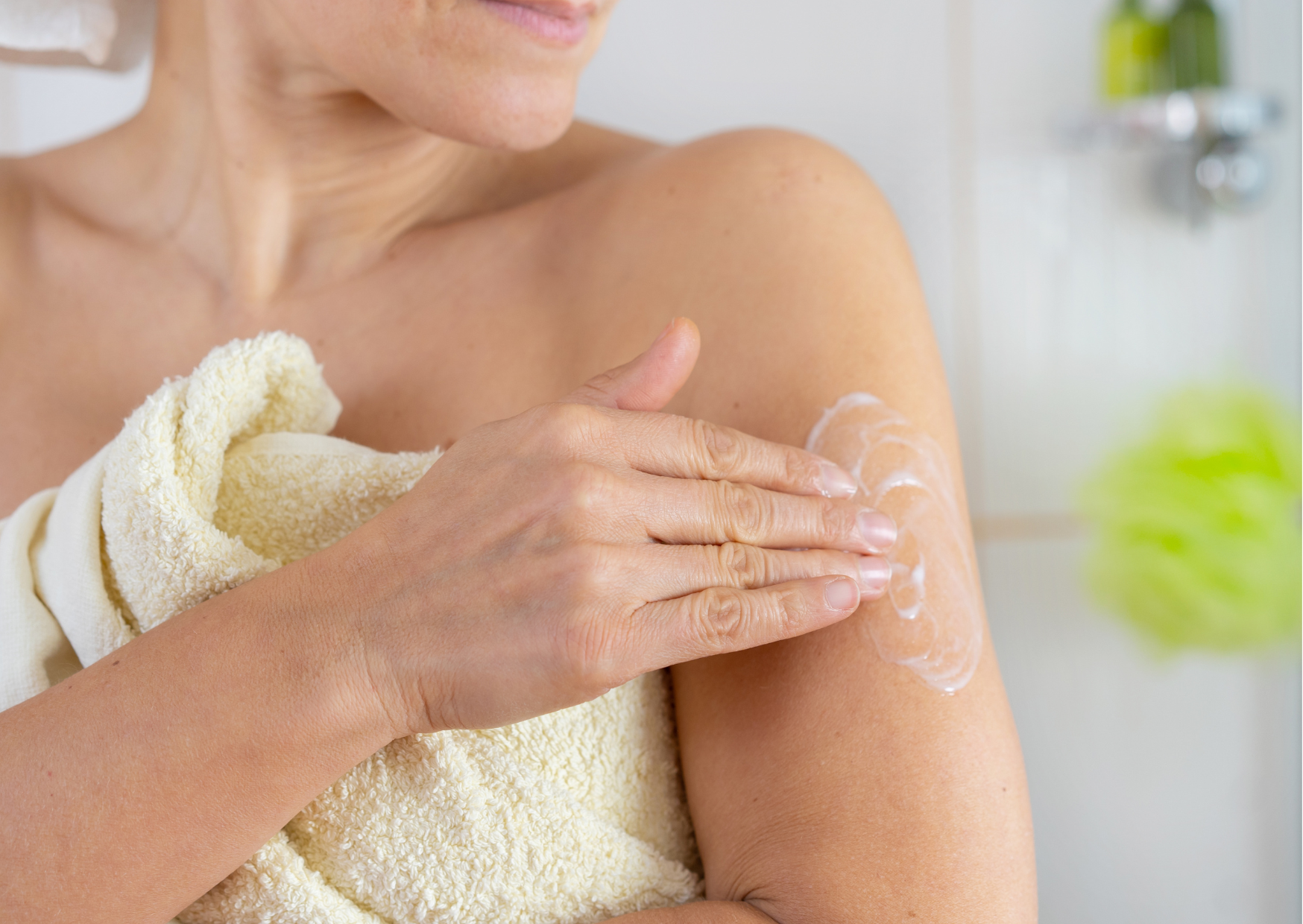Understand the Changes
Maintaining a healthy lifestyle during menopause is not always easy and this transition into menopause can be challenging due to the many hormonal changes occurring in a woman's body. As oestrogen levels decline, it leads to a variety of symptoms.
Hot flashes are sudden feelings of warmth in the face, neck, and chest is very common. Night sweats are also hot flashes that occur with perspiration during sleep. Dress in layers and lower the thermostat to manage symptoms.
- Mood changes - Fluctuating oestrogen can cause anxiety, irritability, depression, and difficulty concentrating. Be patient with yourself and discuss concerns with your doctor.
- Sleep issues - Night sweats and hormone changes can lead to insomnia. Establish a regular sleep routine and make sure your bedroom is cool and comfortable for better sleep.
- Weight gain - With a slower metabolism, fat may redistribute to the abdomen. Eat healthy and stay active to maintain a healthy weight.
- Vaginal dryness - Declining oestrogen levels can make intercourse painful. Use vaginal lubricants and moisturizers to manage dryness and discomfort.
- Decreased libido - Shifting hormones can reduce sex drive, but maintaining intimacy is important. Explore ways to remain close with your partner through open communication.
Staying informed about what to expect will help you handle menopause symptoms. Share concerns with your healthcare provider and get tips tailored to your experience.
Eat a Balance Diet
A balanced diet with the right nutrients and less of things like sugar, alcohol and caffeine can help manage menopausal symptoms and promote overall health. Here are some diet tips for menopausal women:
Get enough calcium and vitamin D for bone health. And during menopause, bone loss accelerates due to declining oestrogen levels. Additionally, consuming calcium-rich foods like milk, yogurt, cheese, fortified plant milks and leafy greens helps rebuild bone. Vitamin D aids calcium absorption and bone growth. Get 600 IU daily from food sources like fatty fish, eggs and fortified milk or supplements.
Eat plenty of fruits and vegetable produce this provides nutrients like magnesium, potassium, and vitamin C important for bone and heart health. Fiber from fruits, veggies and whole grains helps manage weight and cholesterol levels. You should aim for 7-9 servings per day. Go for a rainbow of colours for a variety of vitamins and minerals.
Limit sugar, refined carbs, and unhealthy fats. Therefore, avoid added sugar and limit sweets, desserts, sugary drinks and processed carbs like white bread, pasta, and baked goods, which can lead to crashes and cravings. Choose healthy fats like olive oil over saturated and trans fats.
Drink alcohol moderately and limit caffeine. Too much alcohol can interfere with sleep and impact bone density. Max out at 1 drink per day. Caffeine can worsen hot flashes and insomnia. Have no more than 2 cups of coffee or tea daily. Stay hydrated with water and herbal tea.
Stay Physically Active
Staying physically active is important for managing menopausal symptoms and reducing long-term health risks.
- Get at least 150 minutes per week of moderate-intensity aerobic activity, such as brisk walking or swimming. Aerobic exercise has benefits for heart health, sleep, mood, and weight management.
- Perform strength training exercises 2-3 times per week to maintain muscle mass and bone density. The natural decline of oestrogen during menopause increases the risk of osteoporosis, so weight bearing exercises help strengthen bones.
- Increased activity helps lower risks of obesity, diabetes, and other chronic diseases that become more common after menopause.
- Find activities you enjoy and aim for 30-60 minutes per day if possible. Getting outside for fresh air and sunlight can also boost mood.
- If new to exercise, start slow and gradually increase the duration and intensity. Listen to your body and take rest days when needed.
- Staying active provides physical and mental health benefits during the menopause transition and beyond. Consult a doctor before significantly increasing activity levels

Manage Stress
The menopause transition can be an emotionally challenging time for many women. Fluctuating hormones can cause mood swings, anxiety, irritability, and depression. Stress can also exacerbate menopausal symptoms like hot flashes, night sweats, and sleep disturbances. It's important for women to find healthy ways to manage stress during this period.
Effects of Stress on Menopausal Symptoms
Research indicates that high stress levels can increase the severity and frequency of menopausal symptoms. This is because stress triggers the "fight or flight" response, leading to the release of hormones like cortisol and adrenaline. Chronic stress keeps these hormones elevated, which can disrupt the body's temperature regulation, sleep cycles, and more. Learning to properly deal with stress is key to coping with menopausal symptoms.
Relaxation Techniques
Practicing relaxation techniques like meditation, yoga, deep breathing, and guided imagery can activate the body's relaxation response. This lowers blood pressure, heart rate, and triggers the release of endorphins to induce calm. Try taking a yoga or meditation class, or simply set aside 20-30 minutes a day to focus on deep breathing while listening to calming music or nature sounds. These activities can lower stress and improve sleep quality.
Make Time for Yourself
It's important for women going through menopause to make time for self-care. Pursue hobbies you enjoy, make social connections, and do things that boost your mood like exercising or being outdoors. Say no to obligations that cause stress. Spending time doing pleasurable activities can ease anxiety and depressive feelings associated with menopause. Having a strong support system is also beneficial. Consider joining a menopause support group to share experiences and advice.
Consider Supplements
Taking certain supplements may help relieve symptoms associated with menopause. Two of the most beneficial supplements to consider are:
- Calcium and vitamin D - Getting adequate amounts of these nutrients promotes strong, healthy bones. As oestrogen levels decline during menopause, bone loss accelerates. Taking a calcium supplement with vitamin D helps protect bone mineral density. Aim for around 1200 mg of calcium and 600 IU of vitamin D per day. Good dietary sources include dairy, leafy greens, fatty fish, and fortified foods.
- Black cohosh and phytoestrogens - These herbal supplements may help reduce the frequency and severity of hot flashes. Black cohosh has compounds that mimic oestrogen’s effects. Soy foods contain phytoestrogens that act similarly. While research shows mixed results, many women report relief from trying black cohosh, soy, or red clover supplements. Follow dosage instructions carefully when using herbal remedies.
Consult your doctor before starting any new supplement, especially if you take other medications or have a health condition. A blood test can check for vitamin D deficiency. While supplements may provide symptom relief, they don't replace strategies like a healthy diet, activity, stress management, and doctor follow-ups during menopause.

Improve Sleep
Many women find that their sleep is disrupted during menopause. Hormonal changes can make it more difficult to fall asleep and stay asleep through the night. Sleep disturbances and insomnia are common complaints.
Lack of sleep can exacerbate other menopausal symptoms like mood swings, difficulty concentrating, and low energy. It's important for women to prioritize healthy sleep habits during this transition.
Effects of Menopause on Sleep
- Hot flashes and night sweats frequently disrupt sleep. The drop in oestrogen causes body temperature dysregulation.
- Anxiety and depression may develop, making it harder to fall asleep.
- Lower progesterone levels can interfere with sleep quality.
- Changes to circadian rhythms and decreased melatonin production can make women prone to waking up more throughout the night
Good Sleep Hygiene Tips
- Keep the bedroom cool, quiet, and dark. Use a fan, blackout curtains, white noise machine, or earplugs if needed.
- Avoid screen time for 1-2 hours before bedtime.
- Establish a regular sleep schedule and stick to it, even on weekends.
- Develop a relaxing pre-bedtime routine like taking a bath, reading, or light stretches.
- Avoid caffeine, alcohol, heavy meals, and strenuous exercise for 3-4 hours before bed.
- Limit daytime napping to 30 minutes or less.
Consider cognitive behavioural therapy for insomnia if problems persist
Treat Insomnia and Sleep Disturbances
- Discuss hormone replacement therapy - Low-dose oestrogen patches or progesterone may help stabilize sleep.
- Try supplements like melatonin, magnesium, or valerian root capsules. Check with a doctor first.
- Prescription sleep medication can be used short-term under a doctor's supervision.
- Stress management techniques like meditation, yoga, or progressive muscle relaxation can promote restfulness.
- Maintain a sleep diary to identify patterns and triggers that disrupt sleep.
Getting adequate high-quality sleep is essential during menopause. Prioritizing sleep hygiene, treating insomnia promptly, and managing disruptive symptoms can help women finally get the rest they need.

Discuss Medications
Many women find relief from menopause symptoms with medications. Medications can help manage hot flashes, night sweats, vaginal dryness, and other symptoms.
Hormone Replacement Therapy - HRT
Hormone replacement therapy (HRT) replaces hormones that decline during menopause. The most common type is oestrogen plus progestin therapy. Oestrogen helps reduce hot flashes, night sweats, vaginal dryness, and can prevent bone loss. Progestin is needed for women with a uterus to prevent uterine cancer.
HRT is very effective for treating menopause symptoms. However, there are some risks to consider. HRT slightly increases the risk of breast cancer, heart disease, blood clots, and stroke. The risks are small but need to be discussed with your doctor. Lower doses for shorter durations can reduce these risks.
Non-Hormonal Prescriptions
Non-hormonal prescription medications are available to help manage hot flashes:
- Antidepressants like low-dose paroxetine (Paxil) and venlafaxine (Effexor)
- Gabapentin, an anti-seizure drug
- Clonidine, a blood pressure medication
These options may not be as effective as HRT but avoid hormonal side effects. Discuss the benefits and drawbacks with your healthcare provider
If you have osteoporosis or are at high risk, medications like bisphosphonates (Fosamax, Boniva) can strengthen bones. Raloxifene (Evista) is another osteoporosis medication that also reduces breast cancer risk.
Your doctor may prescribe vaginal oestrogen or medications to help with painful intercourse or urinary issues. Discuss all your symptoms to find the right solutions.
Protect Bone Health
Menopause increases the risk of bone loss. To help keep bones strong:
- Get regular weight-bearing exercise. Weight bearing exercises like walking, jogging, stair climbing and dancing put healthy stress on the bones, promoting strength. Aim for 30-60 minutes most days of the week.
- Eat plenty of calcium and vitamin D. Dairy products, leafy greens, soy, sardines, and supplements provide calcium. Vitamin D is found in fatty fish, eggs, fortified foods like milk, and can be supplemented. These nutrients help maximize bone density.
- Get a bone density screening. A DEXA scan can detect osteoporosis early, when treatment is most effective. Talk to your doctor about getting tested.
- Consider medication if needed. For those with osteoporosis, medications like bisphosphonates can help strengthen bones. Discuss options with your healthcare provider.
Taking proactive steps around diet, exercise and screening can help maintain strong bones during menopause and beyond. Don't ignore bone health - take action to protect yourself from fractures and osteoporosis.
Manage Vaginal Symptoms
Many women experience vaginal dryness and discomfort during menopause. Declining oestrogen levels cause thinning and dryness of the vaginal tissues. This can lead to irritation, itching, burning, and pain during sexual activity. There are several ways to manage these symptoms:
Lubricants and moisturizers can provide relief from vaginal dryness and friction. Water-based lubricants like K-Y Jelly and Astroglide are safe to use. Vaginal moisturizers like Replens and K-Y Silk-E also help by retaining moisture in vaginal tissues. Use lubricants during intercourse and moisturizers several times per week.
Prescription vaginal oestrogen products can effectively treat menopausal vaginal symptoms. These come as creams, tablets or rings that release low doses of oestrogen directly to vaginal tissues. Examples include Premarin and Estrace creams. Prescription oestrogen works better than over-the-counter remedies.
Avoid irritation by using gentle, unscented cleansers for the vulvar area. Avoid douches and vaginal scrubs which can further dry and irritate sensitive tissues. Wear cotton underwear and avoid tight clothing. Also, quit smoking to improve vaginal health and blood circulation.
See your healthcare provider if over-the-counter products do not relieve vaginal dryness or discomfort. Local oestrogen therapy or other prescription medications may help manage symptoms.

Seek Support
The emotional and physical changes of menopause can sometimes feel overwhelming. You don't have to go through it alone. Seeking support can help you better manage symptoms and improve your quality of life.
Discuss Concerns with Your Doctor
Your doctor is an excellent resource for guidance on any concerns related to menopause. Be open about all your symptoms, even if they seem embarrassing. Your doctor can evaluate your symptoms, recommend lifestyle changes and therapies, and rule out any underlying conditions. Don't hesitate to bring up concerns about sexual health, bladder control, anxiety, depression, and any other issues you're facing.
Consider Counselling for Mood Issues
Some women deal with mood changes like anxiety, irritability, or depression during menopause. Counselling can help provide coping strategies, perspective, and emotional support. Cognitive behavioural therapy is effective for addressing mood issues related to menopausal hormone changes.
Join a Support Group
Connecting with other women going through menopause can provide community and comfort. In a support group, you can share your experiences and learn how others manage the transition. Look for local menopause meetup groups or online forums. Some workplaces, hospitals and community centres also host support groups for midlife women's health.
Menopause – Seeking Solace and Connection
